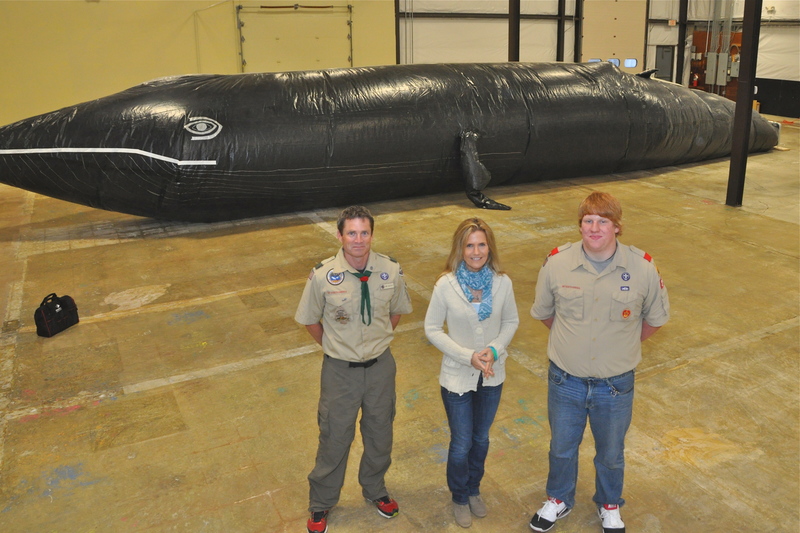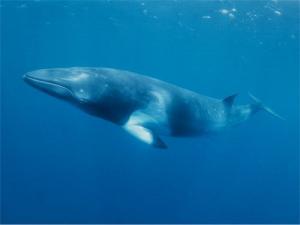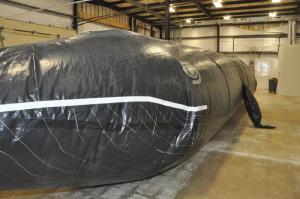New whale arrives at MERR
The Marine Education, Research and Rehabilitation Institute has a new whale. It's the inflatable kind, and it comes to the institute thanks to an unusual Eagle Scout project.
Seventeen-year-old Marshall Brown of Troop 2540 in Lewes fabricated the 60-foot fin whale out of thick plastic and Gorilla tape. It can be inflated in less than 10 minutes with an ordinary house fan placed at the tail. Deflated, it can be folded up to fit in a medium-size plastic storage container.
Brown presented his project to MERR Executive Director Suzanne Thurman March 2. The whale will be the centerpiece of the organization's free outreach and education program, which reached 10,000 people last year. “It will be used by so many children, but adults enjoy it just as much,” she said. “Education is the key to conservation.”
A grant from the Lewes Yacht Club Foundation helped cover costs associated with the project.
Brown has been working on his project for several months. “And as it grew in size, we had to move from place to place,” he said. The actual presentation had to take place in a large, vacant warehouse in Five Point Plaza near Lewes.
Brown said he had to research what a fin whale looks like, and he found plans to fabricate an inflatable version on the internet. “But we had to really modify those plans a lot,” he said.
Besides getting a feel for the actual size of a fin whale, visitors can enter inside the whale and view the skeletal structure drawn on a section of the whale. “The youngest children can relate to this,” Thurman said. “If we can start them early, at a pre-school age, we can hook them in to marine animals.”
Brown is not a stranger to MERR; he has been a volunteer for the organization most of his life. He said it was easy to select the organization to benefit from his Eagle project.
To Thurman, the inflatable whale project has extra-special meaning. Plans for the whale were first developed as a teaching tool at Wheelock College in Boston, Mass., her alma mater.
MERR is a nonprofit stranding response and rehabilitation organization dedicated to conservation of marine mammals and sea turtles. MERR helps to preserve these species through research and rescue efforts and fosters greater understanding and appreciation of these species and their habitat through education and public awareness. MERR is authorized by National Marine Fisheries Service and the state of Delaware as the official stranding responders for marine mammals and sea turtles.
MERR's last inflatable whale, Pearl, was also an Eagle Scout project presented to the organization by Sean Mock in 2007.
Marshall, the son of Mark and Donna Brown, is a junior at Sussex Tech High School. He has one task left on his long Eagle quest; he has to come up with a name for the new whale.
Fin whales are second largest animal
Fin whales are the second largest species of whale, surpassed only by the blue whale. Fin whales, also known as finback whales, can reach lengths of more than 80 feet and weights of more than 80 tons. Fin whales get their name from the prominent and curved dorsal fin, situated two-thirds of the way down their back.
Fin whales can be found along the East Coast from North Carolina northward. The waters off New York are home to approximately 200 to 400 fin whales, while the numbers in the Northwestern Atlantic are estimated to be approximately 2,800. Worldwide, there are approximately 100,000 to 120,000 fin whales. Heavily hunted in the 20th century, the fin whale is considered an endangered species by the U.S. National Marine Fisheries Service and the International Union for Conservation of Nature. It's estimated that nearly 1 million fin whales were taken before the 1986 International Whaling Commission moratorium on commercial whaling was put into place.
For more information on the Marine Education, Research and Rehabilitation Institute go to merrinstitute.org.
























































